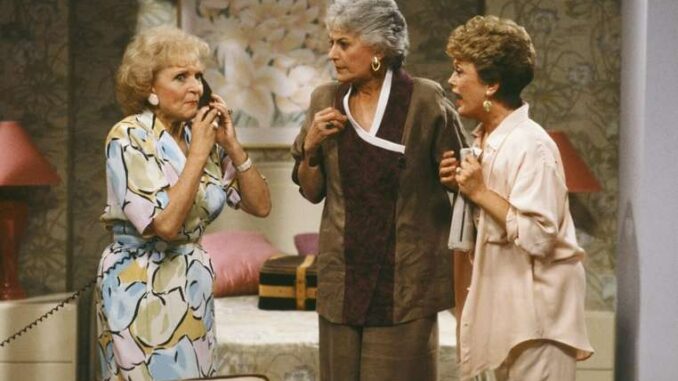
Go ahead, and laugh, but I love The Golden Girls. People think it was Sonny Crockett or Tony Montana that brought me to Miami, but it was really Rose Nylund. They’re probably also why I have an entire office outfitted in rattan.
But I’m not the only one influenced by the show. No, those four firecrackers shaped the attitudes of an entire generation and taught some very early life lessons that many of us still carry around today. The Golden Girls celebrates its 30th anniversary this year, and as I think back on all the funny episodes (180 over seven seasons) I watched as a kid, it’s hard to imagine a more important TV program aired during that time, or since. And here’s why.

Clayton Hollingsworth was our first gay wedding
A few years ago, some anti-gay groups blamed The Golden Girls for creating an entire generation of gay men. It’s comical in its outlandishness, but they do make a good point: The Golden Girls taught a generation of impressionable children that being gay was perfectly fine.
Probably our generation’s first exposure to marriage equality was Blanche’s brother Clayton, who announced he was planning to marry another man. And while Blanche, well, blanched at the thought, it was the witty, biting Sofia who set her straight when she asked, “Everybody wants someone to grow old with, shouldn’t everyone have that chance?” Her message resonated.

They changed how we see “family”
Before The Golden Girls, most TV shows — comedies, anyway — revolved around traditional families or work. And you never really saw shows that focused on groups of adults living single. Sure, in the ’90s Friends and Sex and the City made that chosen “family” concept more common, but The Golden Girls did it first.
Blanche, Dorothy, Rose, and Sofia showed us that we can move away, stay single, and still have people around us who we love. And who loves us? The point is poignantly made in the episode where the four get stuck in Miami for Christmas due to a snowstorm (um, let’s just ignore that) and realize that they are, in fact, still with family for the holidays.
As our generation consistently moves away from our hometowns and waits later in life to start families — or doesn’t start them at all — we’ve begun to form “adopted families.” The next time you have “Friendsgiving” — you know who to thank: no, not Ross and Rachel, the Golden Girls!

Blanche Devereaux, sex educator
If you grew up watching The Golden Girls, you knew about condoms and AIDS long before you saw your seventh-grade health teacher put a rubber on a banana.
The Golden Girls taught us that AIDS can happen to anybody. A year before Magic Johnson publically announced that he was HIV-positive, The Golden Girls aired an episode where Rose thought she may have contracted AIDS during an operation. And while she wondered what she’d done to deserve it, Blanche plainly tells her “It’s not a bad person’s disease.” A fact we take for granted now, but a common misconception in the ’80s.
They also taught women it’s okay to buy condoms. Perhaps my favorite scene ever from the show involves the ladies going to a drugstore to buy a pack, then experiencing the nightmare of the sales clerk announcing over the store’s loudspeaker that he’s “gonna need a price check on some condoms!” As other judgmental patrons look on, Blanche grabs the PA and admonishes all of them with a lecture on sexual responsibility. That message sunk in.
Also, thanks to The Golden Girls, I’m still terrified to buy condoms. Every time I don’t have one but the woman I’m with does (and saves the day!), I thank The Golden Girls. Just not out loud, that would just be weird.

Chipping away at the double standard
Along the same lines, Blanche let women know it’s just as acceptable for them to hook up as men. Samantha Jones reinforced it later but by exposing the silliness of the double standard, and showcasing how to own your sexuality, the show helped influence a generation of women who are more comfortable being forward. So the next time a girl ends a first date by inviting you to go home with her, well, thank The Golden Girls.

Who are you calling “old?”
People think of The Golden Girls as four “old ladies.” But do you know how old Blanche, Dorothy, and Rose were supposed to be? Fifty-six. FIFTY-SIX! That’s the age of a lot of moms are at high school graduations nowadays. Before the Golden Girls, that age meant you were a grandma.
Today, there are chlamydia outbreaks in retirement communities. There are entire dating sites for people over 55, mid-to-late life divorce is normal, and people don’t stay in loveless marriages (as much) out of fear. They find exciting, single lives when they’re older, and have sex until they’re dead. And, yeah, you can thank Pfizer for a lot of that. But you can thank The Golden Girls too.
So, can we give The Golden Girls ALL the credit for molding culture over the past 30 years? Of course, not. But it was the first show many of us saw that offered some alternate messages, and the attitudes it portrayed were way ahead of its time. And today, in an era when an all-female ensemble cast means you either have to be “real” housewives or inmates, we can only hope that future TV shows take more cues from Bea Arthur and Betty White.
